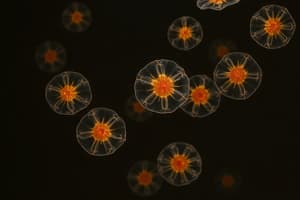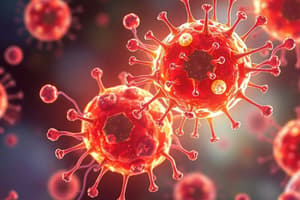Podcast
Questions and Answers
Central memory T cells reside in the bloodstream and provide short-term memory.
Central memory T cells reside in the bloodstream and provide short-term memory.
False (B)
Effector memory T cells circulate in the lymph nodes and are not involved in pathogen engagement.
Effector memory T cells circulate in the lymph nodes and are not involved in pathogen engagement.
False (B)
T cells require only one signal for activation, which is antigen-specific recognition.
T cells require only one signal for activation, which is antigen-specific recognition.
False (B)
The T Cell Receptor (TCR) recognizes and binds to antigens presented by B cells.
The T Cell Receptor (TCR) recognizes and binds to antigens presented by B cells.
The function of the TCR includes signal transduction once it binds to its specific antigen-MHC complex.
The function of the TCR includes signal transduction once it binds to its specific antigen-MHC complex.
Central memory T cells directly kill tumor cells by inducing apoptosis.
Central memory T cells directly kill tumor cells by inducing apoptosis.
Adaptive immunity provides short-term protection against a wide range of pathogens.
Adaptive immunity provides short-term protection against a wide range of pathogens.
Innate immunity recognizes specific antigens on pathogens.
Innate immunity recognizes specific antigens on pathogens.
B cells create antibodies and T cells are responsible for recognizing specific antigens.
B cells create antibodies and T cells are responsible for recognizing specific antigens.
Memory cells are formed in the innate immunity for quicker response to future exposures.
Memory cells are formed in the innate immunity for quicker response to future exposures.
Components of adaptive immunity include Dendritic Cells, Macrophages, and Major Histocompatibility Complex (MHC).
Components of adaptive immunity include Dendritic Cells, Macrophages, and Major Histocompatibility Complex (MHC).
B and T lymphocytes share the location of maturation and the nature of their antigen receptors.
B and T lymphocytes share the location of maturation and the nature of their antigen receptors.
The Classical Pathway of the Complement system is triggered by Mannose-binding lectin (MBL) binding to specific sugar residues on pathogens.
The Classical Pathway of the Complement system is triggered by Mannose-binding lectin (MBL) binding to specific sugar residues on pathogens.
The Alternative Pathway of the Complement system is triggered by spontaneous hydrolysis of C3 in the blood stream.
The Alternative Pathway of the Complement system is triggered by spontaneous hydrolysis of C3 in the blood stream.
Complement deficiencies in Factor D and Factor H are associated with autoimmune diseases such as Systemic Lupus Erythematosus (SLE).
Complement deficiencies in Factor D and Factor H are associated with autoimmune diseases such as Systemic Lupus Erythematosus (SLE).
Deficiencies in C1, C2, and C4 components of the Complement system predispose individuals to Neisseria infections such as meningitis and gonorrhea.
Deficiencies in C1, C2, and C4 components of the Complement system predispose individuals to Neisseria infections such as meningitis and gonorrhea.
The Membrane Attack Complex (MAC) formed in the Complement system is involved in opsonization and phagocytosis.
The Membrane Attack Complex (MAC) formed in the Complement system is involved in opsonization and phagocytosis.
Adaptive immunity is also known as specific immunity and is one of the two main branches of the immune system.
Adaptive immunity is also known as specific immunity and is one of the two main branches of the immune system.
Flashcards are hidden until you start studying




